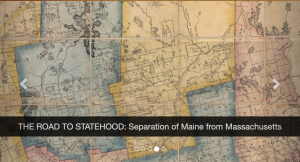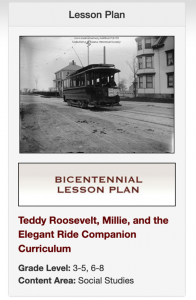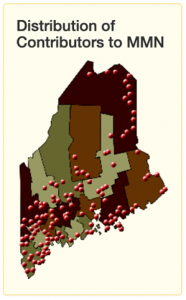
by Rose Dionne
Online may not be the word that springs to mind when one thinks of the State of Maine, but maybe it should be. Maine Memory Network is an online archival resource sharing network created by Maine Historical Society that currently works in partnership with almost three hundred other cultural heritage organizations all over the state of Maine. This project’s mission is to digitize Maine’s history, have a place to share the collections related to it and provide context through essays, digital exhibits and educational resources. These resources can be easily accessed by the public and also cultural heritage professionals at other institutions in the area, creating a more connected understanding of local history that is based on more widely distributed resources than any one institution has access to.
Maine Memory Network was launched in 2006, with 10,000 records contributed by 160 organizations. Today there are over 45,000, resources  dating from ancient archeological findings from the many Native Americans that have called this place home, plenty of 19th century photographs of a flourishing trolley system, and prominent citizens, to digital photographs from the 2000s of mill towns going through downtown revitalizations, and oral histories told by people who have spent their whole lives in Maine. With this range of collected materials there is something for almost everyone, and every project. It is also an active website with many of the newest exhibits focused on Maine’s recent bicentennial, which is an event that Maine Historical has been taking the lead in commemorating. While Maine Memory is certainly not a comprehensive resource of all the archived material that exists in the hundreds of archives, libraries, museums and historical societies, all over the state, (Maine Historical notes that only 1% of their collections are available on Maine Memory Network) it’s strengths lie in the specific resources aimed at teachers or anyone curious about history. While this site is not really aimed what might be considered the traditional archival audience, the fact that much of the material is curated into exhibits and lesson plans that are aimed educators, young students or average people makes it a great advocacy tool. Teaching young people that these resources are out there is important for creating a generation of people who will use and advocate for archives.
dating from ancient archeological findings from the many Native Americans that have called this place home, plenty of 19th century photographs of a flourishing trolley system, and prominent citizens, to digital photographs from the 2000s of mill towns going through downtown revitalizations, and oral histories told by people who have spent their whole lives in Maine. With this range of collected materials there is something for almost everyone, and every project. It is also an active website with many of the newest exhibits focused on Maine’s recent bicentennial, which is an event that Maine Historical has been taking the lead in commemorating. While Maine Memory is certainly not a comprehensive resource of all the archived material that exists in the hundreds of archives, libraries, museums and historical societies, all over the state, (Maine Historical notes that only 1% of their collections are available on Maine Memory Network) it’s strengths lie in the specific resources aimed at teachers or anyone curious about history. While this site is not really aimed what might be considered the traditional archival audience, the fact that much of the material is curated into exhibits and lesson plans that are aimed educators, young students or average people makes it a great advocacy tool. Teaching young people that these resources are out there is important for creating a generation of people who will use and advocate for archives.
Another element of archival outreach that this project accomplishes is towards local institutions. While 50% of the Network’s resources come  directly from Maine Historical Society, that means that half are from those other cultural heritage organizations. Many of the organizations that share their resources on this platform are small historical societies and local libraries that may not have the funding or resources to create and maintain their own public digital collections database. By giving them a place to share those collections Maine Memory Network creates an online presence and public access to the materials specifically, but that also leads to a larger audience. If three hundred different organizations are directing collections material and people to one website that creates both a wide-ranging collection, and wide-ranging audience.
directly from Maine Historical Society, that means that half are from those other cultural heritage organizations. Many of the organizations that share their resources on this platform are small historical societies and local libraries that may not have the funding or resources to create and maintain their own public digital collections database. By giving them a place to share those collections Maine Memory Network creates an online presence and public access to the materials specifically, but that also leads to a larger audience. If three hundred different organizations are directing collections material and people to one website that creates both a wide-ranging collection, and wide-ranging audience.
Sharing resources in the chronically underfunded cultural heritage field is a fantastic practice that can expand access to collections, access to well curated information and create a larger audience than any one organization can reach. As an outreach project this network reaches cultural heritage organizations that can expand the network, and people who might not otherwise work with archival resources regularly. Maine Memory Network brings an awareness and appreciation of history, that all arc
